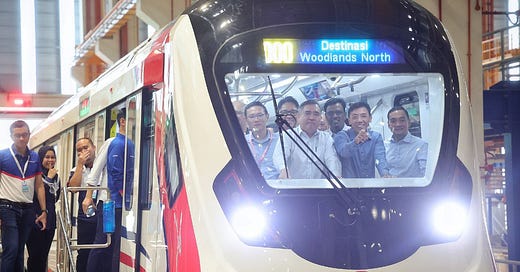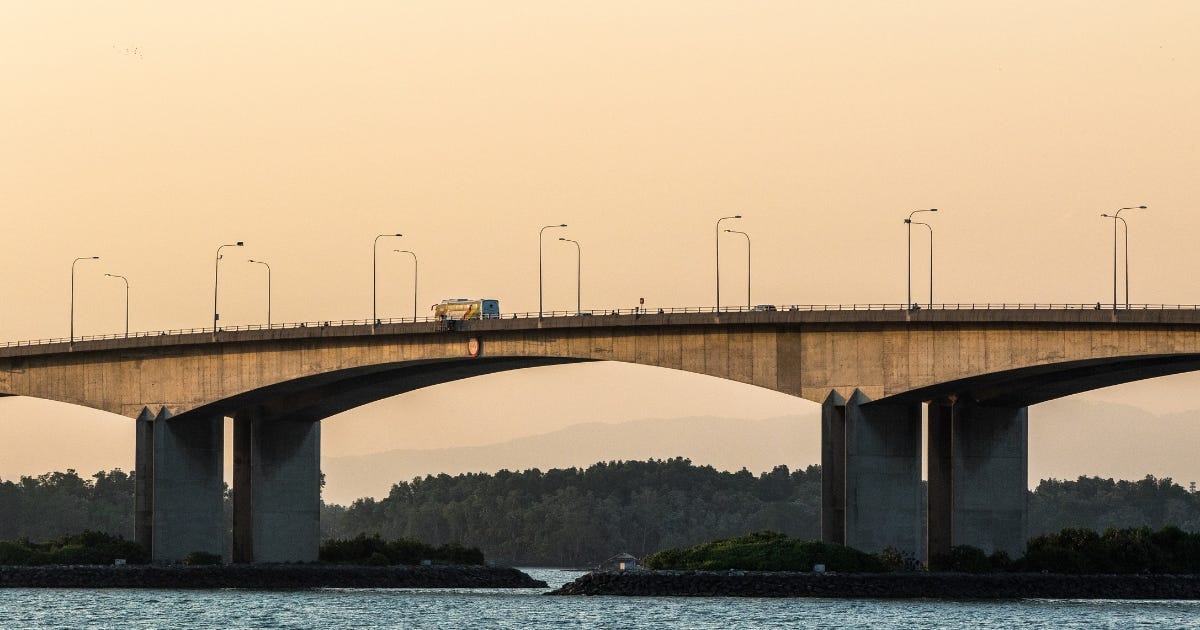Wanted: PAP MPs. Start date: Now.
Also, PAP and WP clash over Pritam’s podcast; PSP renews leadership
Hi everyone,
Last week, Prime Minister Lawrence Wong finished his tour of Asean capitals (minus Naypyidaw, Myanmar, which he will visit “when the situation is more conducive”). On his return, he had a message for the 10-member bloc and Singaporeans: Asean needs bolder reforms to achieve a single market.
PM Wong has pitched this old idea – mooted before by regional leaders and former PM Goh Chok Tong but which he forcefully reiterated at May’s Asean Summit in KL – as a new way forward for the region amid global uncertainty (think US tariffs, which targeted several Asean states).
His argument is that together, the almost 60-year-old bloc will have more leverage, and integration will benefit every country’s citizens. He also reiterated that Singapore’s future is indivisible from Asean’s – a position which the Government has articulated since the early days of independence.
Domestically, we are about two months away from Parliament’s reopening (and a lot more work for us!). We should hear soon about the formation of government parliamentary committees, as several have lost their chairpersons through promotion or retirement. These committees are groups of PAP backbenchers formed to scrutinise government policy, and are part of the ruling party’s argument against the need for more opposition MPs in the House.
This week, we look at post-election announcements from the PAP and PSP, as well as the back-and-forth between the PAP and WP over Opposition leader Pritam Singh’s podcast debut:
It’s tea time
The news: You could soon bump into a potential PAP candidate in your neighbourhood. At a dinner in honour of the party’s recently retired MPs on July 4, PM Wong (who is also party chief) said the PAP has started looking for potential candidates for the next general election, due by 2030.
He wants them to walk the ground earlier, so they can get experience and be assessed by the party and the public.
He also said the party has learnt over the years that it cannot “just rely on a few tea sessions or interviews” to recruit candidates.
The take: PAP leaders have said in the past that preparation for the next election starts right after the polls, so PM Wong’s statement that the party is recruiting is not surprising.
But his remarks also seem like a development in how the PAP will assess said talent – with time in the constituency counting alongside the traditional tea session gauntlet.
This could simply be a formal announcement of a strategy the party has already deployed. In the past general election, some potential candidates were spotted on the ground in the months before the hustings, but were cycled out before Nomination Day.
These include Kawal Pal Singh and Melissa Tan, who had been introduced informally at community events and to the media.
This is perhaps an acknowledgement that some past candidates failed the ‘public eye’ test, and that this happened too late in the game (GE2020’s Ivan Lim comes to mind).
Bringing them in (and out) early and watching how they fare in the off-season seems to be the PAP’s solution.
Bridge over troubled water
The news: The PAP questioned WP chief Pritam Singh’s decision to discuss Singapore politics on Malaysian podcast Keluar Sekejap.
The ruling party also raised the spectre of foreign influence over the WP’s decisions, calling back to an election flashpoint: Malaysia-based Singaporean preacher Noor Deros’ claims that he had met the WP and that the party agreed to reflect his concerns in Parliament.
The WP hit back with examples of PAP leaders going on foreign media to talk about Singapore policies and politics and said the PAP was “opposing for the sake of opposing”. It also said Singh as the Leader of the Opposition is not part of Government, and that there is no explicit rule against him speaking to foreign media.
The PAP replied that the problem was Singh was “focused almost entirely” on discussing domestic politics and that it was his first (and so far only) lengthy post-election media appearance.
The take: After a relatively ‘clean’ campaign, this is arguably a return to form, with the PAP posting their attack on Singh on party website Petir before sending a statement to the media.
While not mudslinging per se, as the criticisms focused on Singh’s actions rather than character, the tone adopted was still a throwback to hardball tactics of the past.
The bigger picture is that the PAP is also making clear that actions they see as possibly courting foreign media and politicians are definitively out of bounds in Singapore politics.
PM Wong put on his Government hat to address these issues during the election but now the party seems to have taken it back into its hands, making it a question of party politics and ideals.
Following the prime minister’s call during the GE for political parties to make clear their stance on foreign interference, Singh drew a firm line against it in local politics. But his continued engagement with Malaysian media and politicians (Keluar Sekejap is hosted by two influential former UMNO stars who some say are seeking a comeback in the next Malaysian GE) will continue to raise questions from the ruling party.
Progress for PSP
The news: Tan Cheng Bock and Hazel Poa have stepped down from PSP leadership. Tan will vacate his position as chairman, while Poa (a former NCMP and party chief) will step down as vice-chair.
Tan was replaced by A’bas Kasmani while Poa had no replacement.
The PSP also replaced its treasurer – Anthony Neo will take over S. Nallakaruppan.
All three stepping down will leave the central executive committee, which has co-opted three first-time candidates fresh from the polls: Sani Ismail, Stephanie Tan and Lawrence Pek.
At a press conference on the changes, party chief Leong Mun Wai pledged party renewal in four areas: nurturing new leaders, building more trust with the electorate, helping Singaporeans to understand government policies, and amplifying its voice online.
He also said the party will continue groundwork in constituencies it contested.
The take: This is an end of an era for the PSP, and perhaps the start of a new one.
Dr Tan has been the face of the party since founding it in 2019, but questions about his advanced age have swirled around the party’s future, especially because he turned 85 during the hustings.
His replacement is significantly younger at 72, and the three new co-opts also inject some fresh blood into the party leadership which has in the past been plagued with perceptions that it is dominated by older folks.
The newcomers are on average younger than those leaving. Stephanie Tan is 37, while Sani and Pek are 49 and 55. Poa is 54, while Nallakaruppan is 60.
Leong said these changes are part of the party’s efforts to address issues it has heard from Singaporeans. After disappointing losses of parliamentary presence and overall vote share, the moves signal that the party is serious about returning to the House.
Retiring PAP heavyweights Teo Chee Hean and Heng Swee Keat will not be getting much of a break after leaving politics. Teo will chair Temasek and be special adviser in the Prime Minister’s Office, while Heng will continue as chairman of the National Research Foundation which is under the PMO.
Billionaire Ong Beng Seng’s court date has been rescheduled, after the court granted an application for more submissions. He was expected to plead guilty on July 3 for his role in former transport minister S. Iswaran’s corruption case.
This was a lengthy issue so we won’t make it longer, but we want to say we have heard you and are working on a deep-dive for the roles of Speaker and Leader ahead of Parliament reopening.
Look out for Wei Kai’s (front page) interviews with Seah Kian Peng and Indranee Rajah in today’s copy of The Straits Times.
We’re always sourcing for more deep dive topics, so reach us at unpacked@sph.com.sg if you have any questions or ideas that we haven’t covered.














